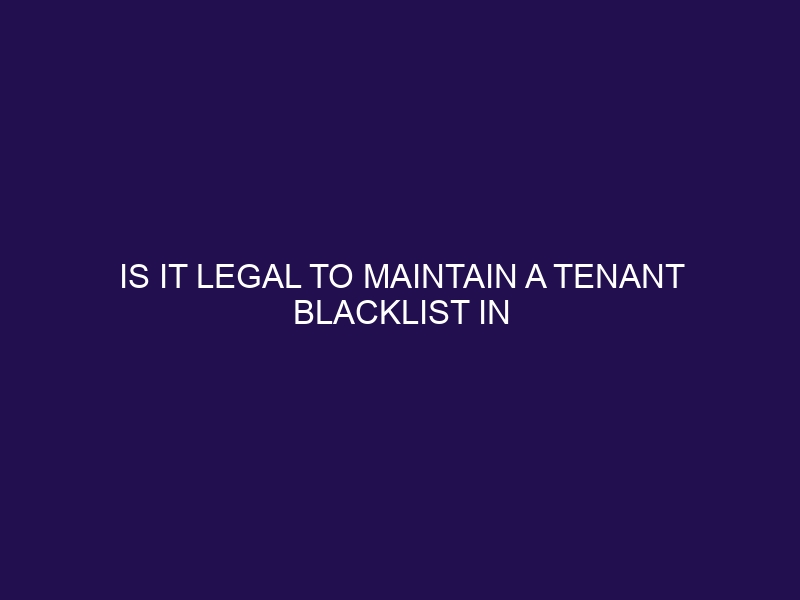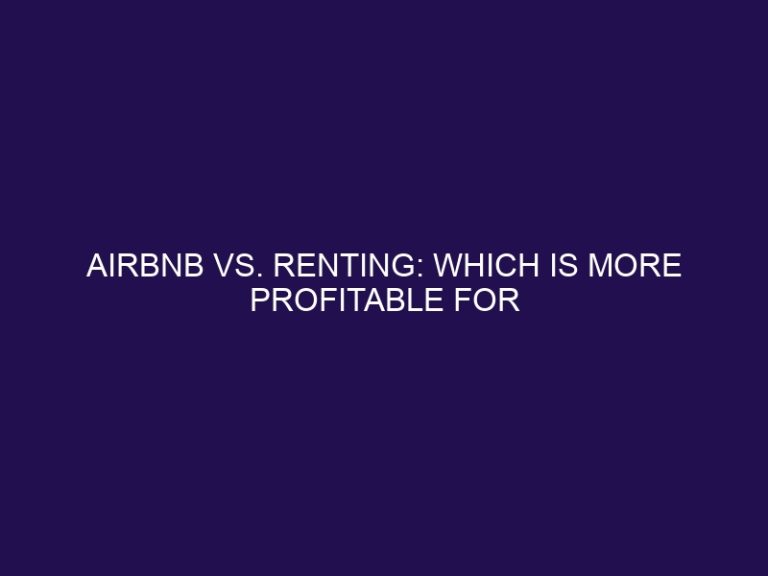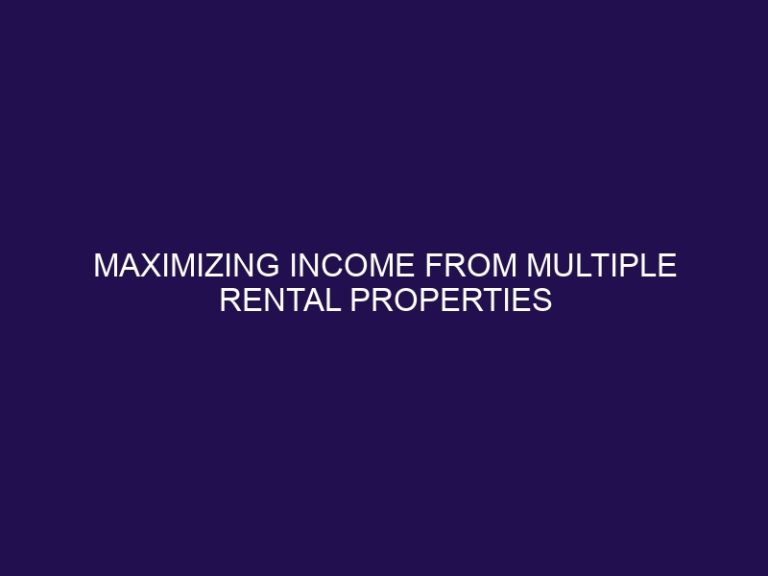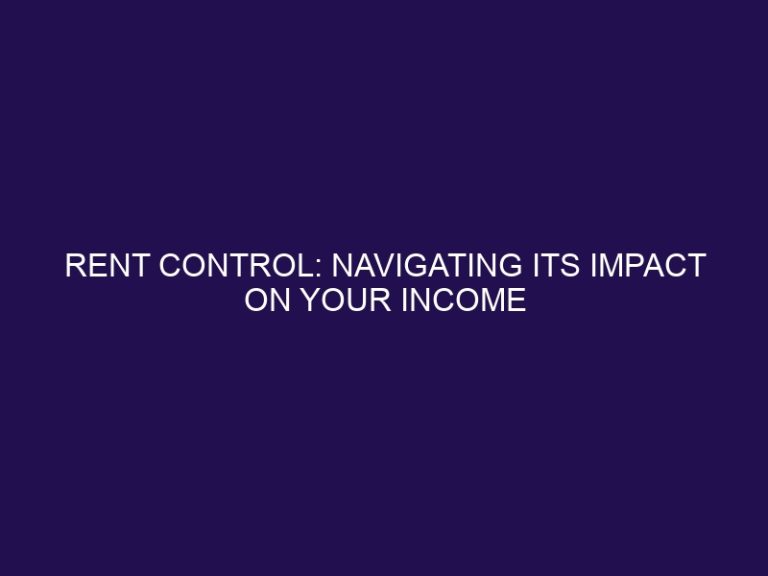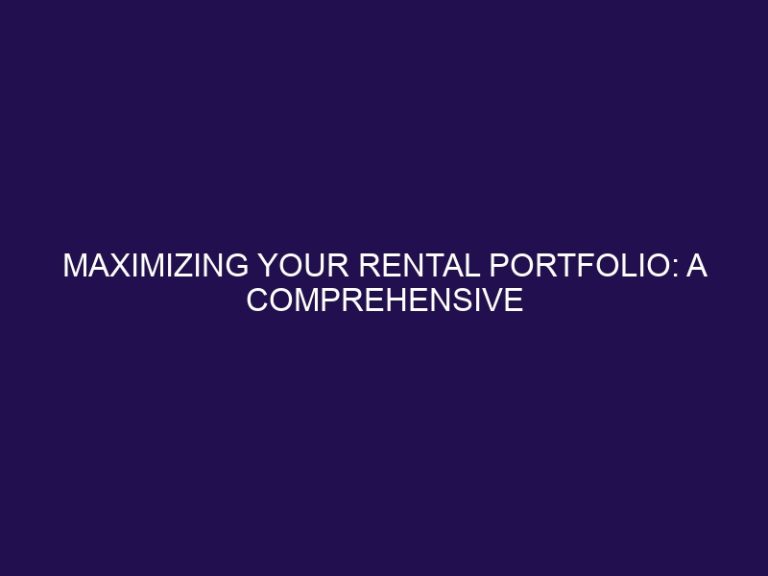Is It Legal To Maintain A Tenant Blacklist in Canada
Maintaining a tenant blacklist, also known as a “bad tenant list,” is a controversial practice among landlords in Canada. This list compiles information about tenants who have caused issues or problems during their tenancy, and is used by landlords to screen potential tenants before renting out their property. However, the legality of maintaining such a list in Canada is a topic of debate. In this article, we will explore the laws surrounding tenant blacklists in Canada, the alternatives to this practice, and the rights of tenants in the country.
What Is A Tenant Blacklist?
A tenant blacklist is a list compiled by landlords or property management companies that contains information about tenants who have had issues during their previous tenancies. This can include late or missed rent payments, property damage, or eviction notices. The purpose of a tenant blacklist is to warn other landlords about potential problematic tenants and to help them make informed decisions before renting out their properties.
Is It Legal To Maintain A Tenant Blacklist In Canada?
The answer to this question is not a simple yes or no. While there are no specific laws in Canada that prohibit the creation of a tenant blacklist, there are laws in place that protect the rights of tenants and their privacy. The main concern with a tenant blacklist is that it may contain inaccurate or outdated information that can harm a tenant’s ability to find housing. Additionally, this practice can also lead to discrimination against certain groups of people.
1. What Are The Laws Surrounding Tenant Blacklists In Canada?
In Canada, the Personal Information Protection and Electronic Documents Act (PIPEDA) protects the privacy of individuals and regulates how their personal information can be used. This means that landlords cannot collect personal information from tenants without their consent or use this information for purposes other than what was agreed upon.
2. What Are The Consequences Of Maintaining A Tenant Blacklist In Canada?
Maintaining a tenant blacklist that contains inaccurate or outdated information can lead to legal consequences for landlords. If a tenant discovers that they have been denied housing because of false information on a blacklist, they can file a complaint with the Office of the Privacy Commissioner of Canada. Landlords may also face legal action for discrimination if they use the blacklist to deny housing to certain groups of people.
How Can Landlords Legally Screen Potential Tenants?
While maintaining a tenant blacklist may seem like an easy way to screen potential tenants, there are legal and ethical alternatives that landlords can use to ensure they are renting to responsible tenants.
1. Credit Checks
Landlords can request a credit report from a potential tenant to assess their financial responsibility and ability to pay rent on time.
2. Reference Checks
Contacting previous landlords or personal references can provide insight into a tenant’s behavior and rental history.
3. Background Checks
Landlords can conduct background checks to ensure that potential tenants do not have a criminal record or a history of evictions.
4. Employment Verification
Confirming a tenant’s employment can provide landlords with information about their income and job stability.
5. Rental History Checks
Landlords can contact previous landlords to gather information about a tenant’s rental history, including whether they were a responsible tenant.
What Are The Alternatives To A Tenant Blacklist?
There are several alternatives to maintaining a tenant blacklist that can help landlords screen potential tenants without violating their privacy or discriminating against certain groups.
1. Tenant Databases
There are databases available that landlords can use to check a potential tenant’s rental history and credit information. These databases are regulated by privacy laws and can provide landlords with accurate and up-to-date information.
2. Tenant Screening Services
Some companies offer tenant screening services that can help landlords gather information about potential tenants without violating their privacy or discriminating against certain groups.
Key Takeaways:
What Is A Tenant Blacklist?
What Is A Tenant Blacklist?
A tenant blacklist is a compilation of individuals who have been evicted or have had problems with past landlords, providing valuable information for landlords to review when considering potential tenants’ rental history and conduct.
Is It Legal To Maintain A Tenant Blacklist In Canada?
Is it legal to maintain a tenant blacklist in Canada? According to the Human Rights Code, it is illegal for landlords to compile or refer to such lists when making rental decisions. This law prohibits discrimination based on factors such as race, ethnicity, or nationality. Landlords who violate this law may face legal consequences.
1. What Are The Laws Surrounding Tenant Blacklists In Canada?
In Canada, the laws surrounding tenant blacklists vary by province. Generally, landlords are prohibited from creating or using blacklists as it violates tenants’ privacy and fair housing rights. Acts such as the Personal Information Protection and Electronic Documents Act govern the collection of tenant data. A landlord who maintains an unauthorized tenant blacklist may face legal consequences.
2. What Are The Consequences Of Maintaining A Tenant Blacklist In Canada?
Maintaining a tenant blacklist in Canada can have serious consequences, including potential discrimination charges, fines, and lawsuits. Landlords must be aware of their obligations under tenant rights and privacy laws, and should consider alternative methods of tenant screening to ensure compliance with fair housing regulations.
How Can Landlords Legally Screen Potential Tenants?
As a landlord in Canada, it is important to properly screen potential tenants to ensure a successful and harmonious tenancy. However, there are strict laws and regulations in place to protect tenants from discrimination and privacy violations. In this section, we will discuss the legal methods that landlords can use to screen potential tenants, including credit checks, reference checks, background checks, employment verification, and rental history checks. These methods are essential for finding responsible and trustworthy tenants while also abiding by the law.
1. Credit Checks
- Conduct credit checks on the tenant through authorized credit bureaus.
- Evaluate the credit score to determine financial responsibility and debt management.
- Examine the credit report for any outstanding debts or delinquencies.
- Take into consideration any extenuating circumstances that may have affected the tenant’s credit history.
2. Reference Checks
- Conduct reference checks with the applicant’s previous landlords to gain insights into their rental history.
- Verify the references provided by the tenant to assess their reliability and trustworthiness.
- Assess the tenant’s behavior and payment history based on feedback from previous rental experiences.
A landlord conducted thorough reference checks and discovered that a potential tenant had a history of late rent payments, helping them make an informed decision.
3. Background Checks
- Verify Identity: Confirm the applicant’s identity through official documents.
- Check Criminal Record: Conduct a criminal background check to ensure safety for other tenants.
- Assess Rental: Contact previous landlords to verify rental behavior and payment history.
Background checks are an essential aspect of protecting property and ensuring a reliable and trustworthy tenant community.
4. Employment Verification
Employment verification is an essential aspect for landlords to consider. By verifying a tenant’s employment, they can ensure their income stability and employment status through various methods such as pay stubs, employment letters, or direct communication with the employer. This process allows landlords to assess the tenant’s ability to consistently meet rent payments and maintain the property.
5. Rental History Checks
- Contact previous landlords for references and rental payment history.
- Verify the duration and consistency of past leases and tenancy.
- Assess any reported damages or disputes during previous tenancies.
What Are The Alternatives To A Tenant Blacklist?
Instead of relying on a tenant blacklist, there are other options available for landlords to screen potential tenants in Canada. These alternatives aim to provide more comprehensive and accurate information about a tenant’s rental history and creditworthiness. In this section, we will discuss two alternatives to a tenant blacklist: tenant databases and tenant screening services. By understanding these alternatives, landlords can make informed decisions when it comes to selecting reliable and responsible tenants.
1. Tenant Databases
- Create a thorough tenant database containing information on rental history, creditworthiness, and references.
- Consistently update the database to maintain accuracy and relevance.
- Utilize tenant screening services to verify the information gathered from the database.
When using tenant databases, it is essential to comply with privacy regulations and prioritize data security.
2. Tenant Screening Services
- Make use of professional tenant screening services to perform comprehensive background checks on prospective tenants.
- Hire these services to confirm credit history, rental history, employment status, and criminal background.
- Guarantee adherence to privacy laws and regulations while utilizing tenant screening services.
What Are The Rights Of Tenants In Canada?
As a tenant in Canada, it is important to know and understand your rights. In this section, we will discuss the fundamental rights that all tenants are entitled to in Canada. These include the right to privacy and the right to fair housing. By understanding these rights, you can better protect yourself and ensure that your landlord is abiding by the law. Let’s dive into the details of these rights and how they apply to tenants in Canada.
1. Right To Privacy
- Tenants have the right to privacy within their rented space, as granted by privacy laws.
2. Right To Fair Housing
In Canada, the right to fair housing guarantees that tenants will not face discrimination based on their race, religion, or disability. Landlords are required to provide equal housing opportunities, ensure safe living conditions, and follow fair rental practices.
Frequently Asked Questions
Is it legal to maintain a tenant blacklist in Canada?
No, it is not legal to maintain a tenant blacklist in Canada. Federal legislation prohibits landlords from creating or maintaining a “bad tenants list” as it could potentially discriminate against tenants and violate privacy laws. Instead, landlords can use resources like the Landlord Credit Bureau (LCB) to report tenant information, both positive and negative, to a centralized database.
What is the purpose of the Landlord Credit Bureau (LCB)?
The LCB allows landlords to report on-time rent payments, late rent payments, and other tenant habits to create a comprehensive Tenant Record. This Tenant Record can be searched by other landlords to determine if a potential tenant is the right fit for their property, making it easier for responsible tenants with a positive Tenant Record to find a place to rent.
What are some primary concerns surrounding hidden bad tenant lists in Canada?
Some major concerns surrounding hidden bad tenant lists in Canada include potential privacy violations, the risk of false or retaliatory information being shared, and the impact on tenants’ ability to find affordable housing. Legal experts, tenant associations, and advocacy groups have raised these concerns and are working towards finding a solution.
Can landlords legally share tenant information on social media or in private Facebook groups?
No, it is not legal for landlords to share tenant information on social media or in private Facebook groups. This includes sharing names and photos of tenants on “bad tenant lists” without their consent. It is important to seek individual legal counsel and follow proper measures, such as using the LCB, when sharing tenant information.
Why do some landlords feel the need to create and share “bad tenant lists” in Canada?
Some landlords argue that they are forced to create these lists in order to protect themselves from potential problem tenants. With a shortage of affordable homes and stiff competition in the rental market, landlords may turn to these lists to avoid renting to tenants who have a history of bad experiences or landlord abuse.
What is Nova Scotia ACORN doing to address hidden bad tenant lists in the province?
Nova Scotia ACORN, an organization that advocates for low to moderate-income individuals, has launched a campaign to bring attention to these lists and the potential harm they can cause. They are calling for better consumer protections, including stricter regulation of landlords and the creation of a public database for rental records.

